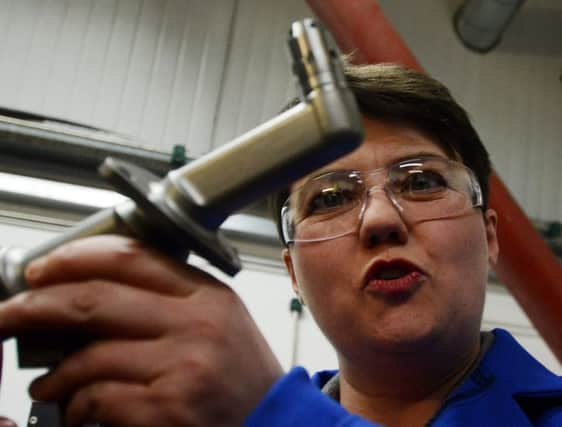Allan Massie: The Lib Dems deserve better


Like several hundred thousand people, I suppose, I received a letter from Ruth Davidson the other day. The message was clear: “The Lib Dems have lost two-thirds of their vote in Scotland. Only the Scottish Conservatives can stand up to the SNP and keep Ed Miliband out of Downing Street.” Well, the words are certainly clear, even if the reasoning is a bit murky, because it’s not evident how standing up to the SNP might, except in a handful of constituencies, prevent Mr Miliband from becoming prime minister. After all, in much of Scotland, the battle is between the SNP and Labour, both of which parties are apparently committed to putting Mr Miliband in Downing Street – the only difference being that Labour want a majority Labour government, and the SNP a minority Labour one, propped up by them.
However, back to Ms Davidson’s assertion. The Liberal Democrats may indeed, as she says, have lost two-thirds of their vote here in Scotland. This doesn’t, however, necessarily mean that their decline has been uniform. There are Liberal Democrat seats where they, as the incumbents, may be better suited than the Tories to hold off the SNP.
Advertisement
Hide AdAdvertisement
Hide AdBut Ms Davidson assures me that the Lib Dem party is “on course to lose every single one of its mainland Scottish seats”. She may be right, but how can one tell?


Last year, before the post-referendum surge in the SNP membership and the movement of the polls in their favour, I had more or less decided to vote Liberal Democrat, something I haven’t done since the 1980s when David Steel was our MP. This was partly because I have developed a considerable respect for Michael Moore, who has been a very good constituency MP and did a good job as Secretary of State for Scotland before being – unnecessarily in my opinion – shunted aside to be replaced by Alistair Carmichael.
There were other reasons, however. First, the Liberal Democrats have deserved well of the country. The great Duke of Wellington was not a very successful politician, but he had one admirable maxim: “The Queen’s Government must be carried on.” In other words, there must be a government capable of commanding majority support in the House of Commons. By entering into coalition with the Conservatives, the Lib Dems ensured that this would be the case.
They did so at some cost to themselves. They lost credibility with many who had voted for them when they had perforce to abandon their opposition to university fees in England and Wales. In fact, they would have had to do this even if they had chosen to ally themselves to Labour instead, for Labour had also pledged to accept the recommendation of the commission set up to advise on this subject, a commission headed by Lord Browne and established by the outgoing Labour government. But that’s how it is. The smaller party in any coalition must always make concessions to their partners.
The coalition took office at a time of economic and financial crisis. It has held together for the full five years and the storm has been weathered. We have come out of recession. There is strong growth in the economy. Unemployment has fallen and continues to fall. The number of people in work is higher than ever. This is a considerable achievement and the Lib Dems have contributed to it, not least because economic and fiscal matters have been the responsibility of the Quartet – David Cameron and George Osborne for the Tories, Nick Clegg and Danny Alexander for the Lib Dems. Moreover, it is thanks to the Lib Dems’ insistence that the level at which people are required to pay income tax has been steadily raised, and more than a million people taken out of tax.
So, by and large, the Liberal Democrats’ record in government is good, and for this reason they deserve to retain the support of most of those who voted for them five years ago.
Some deserted them almost at once, apparently simply because Nick Clegg had chosen to join the Tories. No doubt in some case people defected because in their own constituency they had voted Lib Dem primarily to keep the Tories out. Nevertheless, one wonders what other deserters thought they were voting for. Perhaps they simply didn’t want to be in government, preferred the irresponsibility of opposition, and resented their leaders’ decision to behave like grown-up politicians.
In general, the coalition has been a good government, one of the better ones of the last 50 years, and this would normally be at least as good a reason for sensible people of a conservative inclination to vote Tory as to vote Lib Dem.
Advertisement
Hide AdAdvertisement
Hide AdIf last year I was inclined to prefer the Lib Dem option, it was largely because the anti-European Union obsession of a large section of the Tory party, in and out of Parliament, seems to me daft. The EU has its faults and weaknesses. Nevertheless its creation, with the consequent requirement for member states to reconcile differences by discussion and negotiation in order to achieve a consensus, is, for anyone with an awareness of the history of Europe in the first half of the 20th century, the most admirable political development of our lifetime.
The EU is far from perfect, for, as Scott has Bailie Nicol Jarvie say, “there‘s naething this side o‘ Time but it micht hae been better”, but it has made for peace and prosperity. So, as the Liberal Democrats are on the right side of the European debate, while the Tory position is uncertain, that seemed to me last year to be a clinching argument to vote for them.
It remains a strong one, but now, for Scottish Unionists, the most important question is how to defeat the SNP and check its advance. This means judging in constituencies presently held by the Lib Dems whether they or the Tories are better placed to do so. There are some, including Gordon and Danny Alexander’s Highland seat where the Lib Dems seem more likely to beat the SNP; others, like Michael Moore’s Borders one where it’s by no means evident. So one is in a quandary. Ruth Davidson’s assurance that only the Scottish Conservatives can stand up to the SNP may be well-judged, but one thing is clear to me: the Liberal Democrats don‘t deserve to do as badly as forecasts suggest they will.